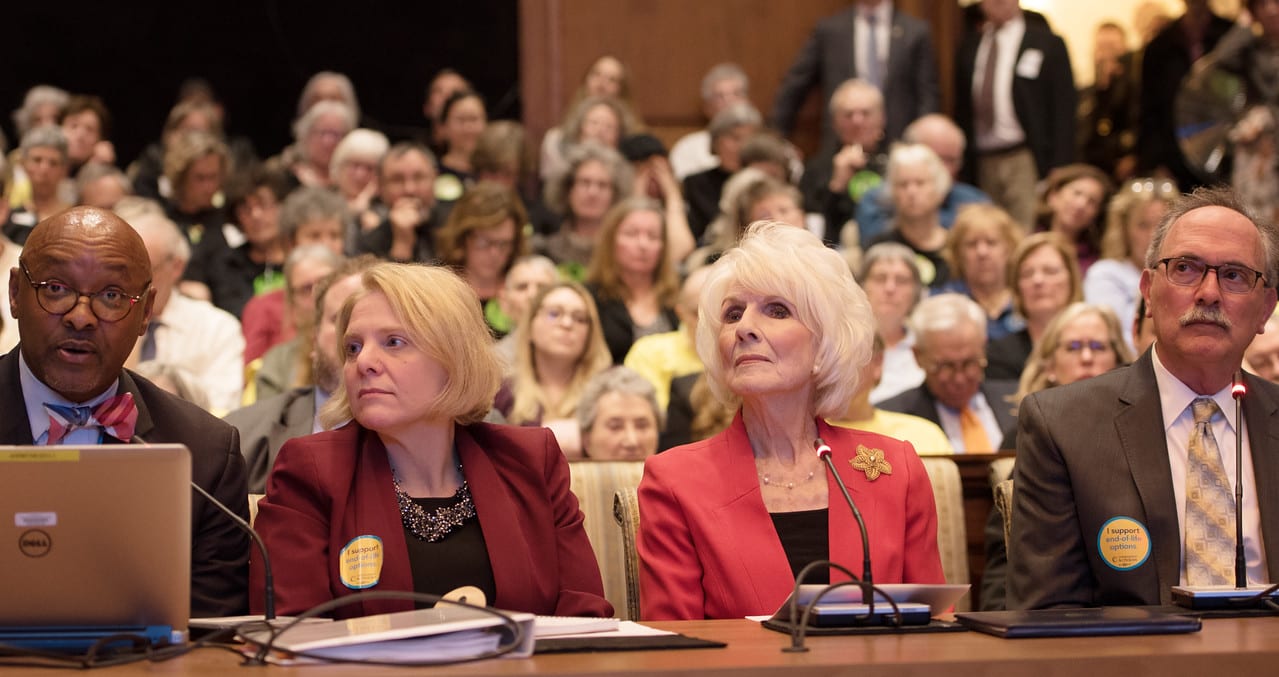End-of-Life Option Bill Supporters Urge Massachusetts Joint Public Health Committee to Pass It
Supporters deliver emotionally compelling testimony about urgent need for passage of bill
Jun 25, 2019 Diane Rehm Massachusetts Massachusetts End of Life Options Act
Compassion & Choices and its Massachusetts supporters testified before the Joint Committee on Public Health today in support of legislation that would authorize medical aid in dying as an end-of-life care option in the state. The bill, the Massachusetts End of Life Options Act (H.1926/S.1208), would give mentally capable, terminally ill individuals with a prognosis of six months or less to live the option to request, obtain and self-ingest medication to die peacefully in their sleep if their suffering becomes unbearable.
The legislation is sponsored by Representative Louis L. Kafka and Senator William N. Brownsberger and has 69 total sponsors (more than one-third of the 200 lawmakers), including Joint Committee on Public Health co-chair, Senator Joanne M. Comerford. It was introduced in the House and Senate on Jan. 8 and 14, respectively. The bill is modeled after the Oregon Death with Dignity Act, which has been successfully implemented for more than 20 years with no record of abuse or misuse. Advocates and people living with terminal illnesses from across the state attended the hearing.

Among the testifiers was Diane Rehm, currently the host of the “On My Mind” podcast produced by Washington, D.C. public radio station WAMU-88.5 FM and the former host for 37 years of the nationally syndicated NPR daily news talk show, “The Diane Rehm Show.” Rehm’s husband of 54 years, John Rehm, died in agony in a Maryland nursing home from Parkinson’s Disease.
“Watching John in those last 10 days of his life made me angry,” Rehm told the committee. “Why did our laws infringe upon an individual’s decision to peacefully die when dying was inevitable within a few months? … please pass this bill into law.”
Rabbi Elias Lieberman of the Falmouth Jewish Congregation testified: “As a person of faith and as someone who chose a profession in which I am expected to offer guidance and support to those facing the ultimate existential questions, I believe firmly that terminally ill, mentally capable adults should be afforded the option to die peacefully when their suffering renders living intolerable.”
“In more than 40 years of combined experience across seven states and Washington, D.C., there has not been a single documented incidence of abuse or coercion,” said Compassion & Choices CEO Kim Callinan. “While it’s easy for opponents to come up with worse case scenarios and hypotheticals, the concerns they raise simply have not been borne out in the data or evidence. Terminally ill Bay Staters don’t have the luxury of endless deliberations; they need this compassionate option right now.”
According to the most recent poll on the issue by Purple Insights in 2014, seven out of 10 Massachusetts voters (71%) support a proposal to allow “mentally competent, terminally ill patients with less than six months to live be able to end their life in a humane and dignified manner, using prescription medications they can self-administer.”
Bill supporters of the Massachusetts End of Life Options Act include the ACLU of Massachusetts, Boston Ethical Society, Fenway Health/AIDS Action, Greater Boston Humanists, National Association of Social Workers (NASW) Massachusetts, and Northampton City Council.
Medical aid-in-dying is currently authorized in 10 U.S. jurisdictions: Oregon (1994), Washington (2008), Montana (2009), Vermont (2013), California (2015), Colorado (2016), Washington, D.C. (2017), Hawai‘i (2018), New Jersey (2019) and Maine (2019). Once laws in New Jersey and Maine law take effect later this year, more than one-fifth of the nation’s population will have access to this end-of-life care option.


